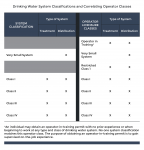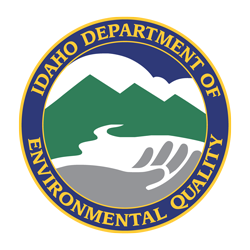DEQ, the Idaho Division of Occupational and Professional Licenses (IDOPL), and public drinking water system owners have different and distinct responsibilities regarding drinking water system classification and operator licensing.
- DEQ determines system classifications and ensures that all community and nontransient noncommunity public drinking water systems and all public surface water systems are supervised by an appropriately licensed responsible charge operator and licensed operating personnel.
- IDOPL is an umbrella agency that contracts with the state’s professional and occupational licensing boards to ensure personnel are appropriately trained and licensed. In the case of drinking water, IDOPL contracts with the Idaho Board of Drinking Water and Wastewater Professionals for these services. The board establishes requirements for operator licenses, determines education and continuing education requirements, sets fees, reviews applications, and issues licenses.
- System owners are responsible for reporting to DEQ on the current classification status every 5 years or anytime a substantive change or upgrade is made to the treatment or distribution system. The system’s owner is responsible for ensuring that the responsible charge operator and substitute responsible charge operator have the appropriate level of licensing that is equal to or greater than the system’s classification.
The Idaho Rules for Public Drinking Water Systems require that DEQ classify all community, nontransient noncommunity, and surface water public drinking water systems with a treatment and/or distribution classification based on indicators of potential health risk. Criteria used to determine the potential health risks include the system’s complexity, size, and source water for treatment facilities; complexity and size of distribution systems; and other criteria deemed appropriate. Systems are classified by type (treatment or distribution) and class. Classifications range from Very Small to Class I, II, III, or IV. The rules also require that public drinking water systems be staffed by licensed operators based on the system classification.
This accordion will not appear on the screen
Each public water system’s owner must calculate the system’s treatment and/or distribution classification to ensure its operators, and in particular, the responsible and substitute responsible charge operators, are properly licensed.
Distribution System Classification
Based on complexity and population served as follows:
- Very Small Water System (VSWS) * see definition below
- Distribution Class I – 501 to 1,500 (DWD1)
- Distribution Class II – 1,501 to 15,000 (DWD2)
- Distribution Class III – 15,001 to 50,000 (DWD3)
- Distribution Class IV – 50,001 and greater (DWD4)
* Very Small Public Drinking Water System – A community or nontransient non-community public water system that serves 500 persons or less and has no treatment other than disinfection ** or has only treatment, which does not require any chemical treatment, process adjustment, backwashing, or media regeneration by an operator. (e.g. calcium carbonate filters, granular activated carbon filters, cartridge filters, ion exchangers.)
** Disinfection – Introduction of chlorine or other agent or process approved by DEQ, insufficient concentration and for the time required to kill or inactivate pathogenic and indicator organisms.
Treatment System Classification
Based on a point matrix associated with population, primary source type, and treatment processes associated with public water system treatment plants that are tracked in DEQ’s Safe Drinking Water Information System (SDWIS):
- Treatment Class I – 0 to 30 points (DWT1)
- Treatment Class II – 31 to 55 points (DWT2)
- Treatment Class III – 56 to 75 points (DWT3)
- Treatment Class IV – 76 points and greater (DWT4)
Worksheet
A worksheet has been developed to assist the owner of a public water system in determining system classifications. System classifications need to be reviewed at least every 5 years or any time a substantive change or upgrade is made to the treatment or distribution system (IDAPA 58.01.08.553). The public water system’s regulating agency representative (DEQ or Health District) must be notified of any changes that would affect the system’s classification.
Two options (New or Existing systems):
New system owners need to complete the following blank classification worksheet:
- Drinking Water Distribution and Treatment System Classification Worksheet (This form works best in Internet Explorer or Adobe Acrobat).
Existing system owners need to review the following automated classification worksheet:
Once a public water system’s information has been placed into the Drinking Water Bureau’s database, system classifications will automatically be generated through this “System Classification Worksheet” application.
Please review and notify your DEQ or health district representative if changes to the System Classification worksheet information are needed.
DEQ updates a list of drinking water treatment and distribution system classifications daily.
Note: This list is a snapshot in time according to the date shown on the list.
The Idaho Rules for Public Drinking Water Systems require the owners of all public drinking water systems (except transient systems served by ground water) to have a responsible charge operator and, when the responsible charge operator is not available, to designate a substitute responsible charge operator to replace the responsible charge operator. The operators must be licensed at a type and class equal to or greater than the classification of the system. Responsible charge means active daily on-site or on-call responsibility for the performance of operations or active, on-going, on-site or on-call directions of employees and assistants. The responsible charge operator and substitute responsible charge operator must be two different people. DEQ ensures that PWSs comply with this requirement.
Note: The Idaho Division of Occupational and Professional Licenses (IDOPL) is responsible for ensuring that operators are properly trained and for issuing operator licenses. For information on operator licensure requirements, education and continuing education requirements, and fees, and to apply for an operator license, visit the IDOPL website.
This accordion will not appear on the screen
The class of licensed  operator required is based on the type and class of the public water system. The table below shows nine different types and classes of drinking water systems and thirteen different types and classes of drinking water operator classes for which licenses are issued. Click on the Drinking Water System Classifications and Correlating Operator Classes image to enlarge.
operator required is based on the type and class of the public water system. The table below shows nine different types and classes of drinking water systems and thirteen different types and classes of drinking water operator classes for which licenses are issued. Click on the Drinking Water System Classifications and Correlating Operator Classes image to enlarge.
The owners and managers of PWSs may choose how to meet the licensed operator requirement. Larger systems are usually operated by an employee of the system. Smaller systems can be operated by a volunteer (either an unpaid association member or an individual served by the system) who agrees to become licensed and provide supervision.
The requirement for licensure can also be met by contracting for this service with a licensed public drinking water operator or with another drinking water system that has licensed operators. In all cases, the contracted operator or contractor employed by the system serves as the responsible charge operator and must be licensed at the grade equal to or greater than the classification of the system.
If the decision is made to contract with a licensed operator, the terms of the contract or agreement should outline the supervision or responsible charge duties assigned to the contracted individual, state the specific duties to be performed, and identify situations when the contractor must get prior permission from the system owner for a situation not covered in the contract.
Update Drinking Water Contacts – Review and update public water system population, connections, and contacts.
To assist systems in finding and hiring independent licensed operators, DEQ has prepared a summary of contract issues that should be discussed when interviewing potential contract operator candidates.
Many operators have indicated an interest in hiring their services for contract work at drinking water systems. Search for a contract operator for hire or, if you are a licensed operator interested in contracting out your services, submit your name below.
The drinking water system owner or the owner’s designee can add a contact or update address, telephone number, or e-mail information by using our online drinking water contact application.

